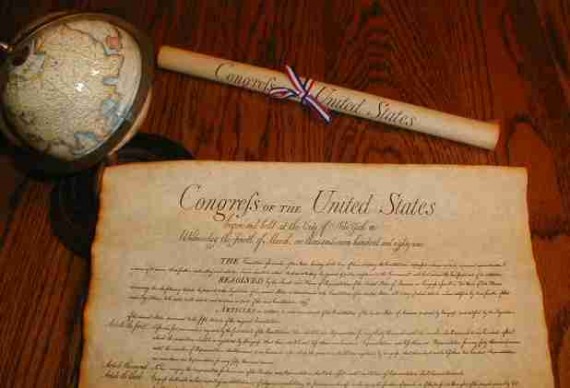The Obama Administration Wants To Read Your Email (Without A Warrant)
The Obama Administration is resisting efforts to expand Fourth Amendment protections to services like Gmail. That's unfortunate.
The Obama Administration is resisting an effort to extend 4th Amendment protections to electronic mail storied on third-party servers, such as services like Gmail and Yahoo:
The Obama administration is urging Congress not to adopt legislation that would impose constitutional safeguards on Americans’ e-mail stored in the cloud.
As the law stands now, the authorities may obtain cloud e-mail without a warrant if it is older than 180 days, thanks to the Electronic Communications Privacy Act adopted in 1986. At that time, e-mail left on a third-party server for six months was considered to be abandoned, and thus enjoyed less privacy protection. However, the law demands warrants for the authorities to seize e-mail from a person’s hard drive.
A coalition of internet service providers and other groups, known as Digital Due Process, has lobbied for an update to the law to treat both cloud- and home-stored e-mail the same, and thus require a probable-cause warrant for access. The Senate Judiciary Committee held a hearing on that topic Tuesday.
The Obama Administration, however, feels quite differently, as evidence by the testimony of Deputy Attorney General James Baker (PDF):
Congress should recognize the collateral consequences to criminal law enforcement and the national security of the United States if ECPA were to provide only one means — a probable cause warrant — for compelling disclosure of all stored content. For example, in order to obtain a search warrant for a particular e-mail account, law enforcement has to establish probable cause to believe that evidence will be found in that particular account. In some cases, this link can be hard to establish. In one recent case, for example, law enforcement officers knew that a child exploitation subject had used one account to send and receive child pornography, and officers discovered that he had another email account, but they lacked evidence about his use of the second account.
(…)
The government’s ability to access, review, analyze and act promptly upon the communications of criminals that we acquire lawfully, as well as data pertaining to such communications, is vital to our mission to protect the public from terrorists, spies, organized criminals, kidnappers and other malicious actors”
This is the same standard canard you get from law enforcement whenever it comes to protecting the privacy of citizens, and it’s as ridiculous here as it is in other situations. First of all, does anyone really think that this rogue’s gallery of “terrorists, spies, organized criminals, kidnappers and other malicious actors” is really using Gmail, Yahoo, or Twitter’s Direct Messaging service to plot their next criminal action? Perhaps the stupid ones are, but it isn’t the stupid ones that we need to worry about. The truly dangerous criminals already know the FBI might be watching, and they take steps to shield their communications. Second of all, the requirements of the 4th Amendment really aren’t that stringent; all it requires is probable cause, which is generally defined as:
The Oxford Companion to American Law defines probable cause as “information sufficient to warrant a prudent person’s belief that the wanted individual had committed a crime (for an arrest warrant) or that evidence of a crime or contraband would be found in a search (for a search warrant)”.
How that standard is applied in individual circumstances has been refined by the Supreme Court over the years. Nonetheless the principle remains the same, if this law passed and a law enforcement officer could convince a judge that they had a reasonable belief that there was evidence of a crime that could be obtained from a person’s Gmail account then they’d have their warrant. What, exactly, is so hard about that?
Moreover, expanding Fourth Amendment protections to email stored “in the cloud” would bring the law up to date with the manner in which email has evolved from something you accessed over a phone line and downloaded to your local hard drive to a web-based service that you can access from anywhere on a multitude of devices.
In Katz v. United States 389 U.S. 347 (1967) Justice Harlan set forth in a concurring a opinion a two-part test that has become a standard part of Fourth Amendment analysis:
(1) the individual “has exhibited an actual (subjective) expectation of privacy,” and (2) society is prepared to recognize that this expectation is (objectively) reasonable, then there is a right of privacy in the given circumstance
This standard was later adopted by the full court in a subsequent case. Applying this standard to services like Gmail, it’s fairly easy to see that a person who creates a password protected email account has a belief that the contents of that account will remain private. In many states, in fact, it is now a crime for third parties to access the account, even if they are family members of the account holder. Furthermore, given how widespread these third-party email services have become, such an expectation of privacy seems to be reasonable in this case (a conclusion that is bolstered, of course, by the fact that the law already recognizes a right to privacy against access by non-governmental actors).
CNet’s Declan McCullough points out that the Administration’s position here contradicts the position that then-Senator Obama took on these issues when he was a candidate for President:
Strengthening privacy laws is precisely what Obama pledged during the 2008 presidential campaign. He told CNET at the time that: “I will work with leading legislators, privacy advocates, and business leaders to strengthen both voluntary and legally required privacy protections.”
- The government should obtain a search warrant based on probable cause before it can compel a service provider to disclose a user’s private communications or documents stored online.
- The government should obtain a search warrant based on probable cause before it can track, prospectively or retrospectively, the location of a cell phone or other mobile communications device.
- Before obtaining transactional data in real time about when and with whom an individual communicates using email, instant messaging, text messaging, the telephone or any other communications technology, the government should demonstrate to a court that such data is relevant to an authorized criminal investigation.
- Before obtaining transactional data about multiple unidentified users of communications or other online services when trying to track down a suspect, the government should first demonstrate to a court that the data is needed for its criminal investigation.
These all sound like excellent ideas to me. It’s too bad that the Obama Administration, like the Bush Administration before it, is more intent on expanding the power of law enforcement than protecting the rights of American citizens.







I say, if they’re so concerned about erectile dysfunction they should get their own damned email accounts.
Yup, six of one, half a dozen of the other. As usual.
Have the protections of mail sent through the postal services been relaxed? If not, why should the laws regarding these forms of communication be relaxed?
Every day we see another one of rights eating away. Don`t get me wrong I want the bad guys caught but these rights were put in place for a reason. Freedom of speech has been trampled on so many times rights to privacy going away. All the things that made our country great is slowly or not so slowly away. What is going on to make Obama go this way? I think the only change he is making is his mind.
But when a corporation wants to engage in these practices, and somebody says, “WAIT!!!” Welll… that is interference with the free market.
“It’s too bad that the Obama Administration, like the Bush Administration before it, is more intent on expanding the power of law enforcement than protecting the rights of American citizens.”
You make some good points here, though it does seem like you want to imply that Obama himself is giving the opening arguments in the case…
Part of the reason that the government, whatever administration is running it, seeks more power is because we give it to them. No, it’s more than that: we demand that they take it.
The rules on standard mail is that once it has been delivered to the recipient, you no longer have an expectation to privacy. When you apply this same rule to email, you get a different outcome, because after the email is delivered to the recipient, your ISP or their ISP or some web host may still have a copy of it, which the government can then access without a warrant.
All of this is mooted by some simple encryption. And honestly, encrypting email is so trivially easy these days, this invasion of privacy probably wouldn’t even catch the stupid terrorists.
Not him directly, but his deputies at DOJ are. As President, it’s ultimately his policy